Vitamin E is a fat-soluble vitamin found in many foods, fats, and oils. Vitamin E is also an antioxidant, a substance that helps protect the body’s cells from damage. Vitamin E is a nutrient that is important for vision, reproduction, and the health of our blood, brain, and skin.
10 Great Food Sources of Vitamin E
1. Wheat Germ Oil
Wheat germ oil – contains vitamin E, vitamin A, vitamin B, and vitamin D. Apart from this, it also contains potassium, zinc, iron, magnesium, and phosphorus. Its oil is extracted from the center of wheat kernels by cold-press method. It is also known as ‘liquid gold’. It is very beneficial for our skin and hair. It helps keep blood pressure normal and reduces heart-related diseases.
2. Shrimp
Vitamin B12, Vitamin E, Vitamin A, and Vitamin B6 are found in abundance in lobster. Apart from this, selenium, magnesium, copper, zinc, and phosphorus are also found in it. Consuming lobster helps in reducing the risk of heart disease. It prevents diseases like dementia and Parkinson’s. And it helps in the development of red blood cells.
3. Spinach
Spinach contains vitamin E, vitamin A, vitamin C, vitamin K, vitamin B6, and vitamin B9. It also contains abundant nutrients, including calories, protein, and carbohydrates. The nutrients found in spinach are low in calories and low in fat. Consumption of spinach improves eye diseases and heart diseases.
4. Pumpkin
We can call pumpkin either a fruit or a vegetable. Pumpkin contains vitamin E, vitamin A, and vitamin C. It also contains other nutrients like omega-3 fatty acids, zinc, selenium, iron, magnesium, beta-carotene, potassium, and fiber. Pumpkin seeds are also edible and are rich in nutrients like iron, zinc, potassium, and magnesium.
5. Sunflower Oil
Sunflower oil is called sunflower oil in English. Sunflower oil provides more vitamin E than other vegetable oils. Apart from this, sunflower oil contains many nutrients like omega-3 and omega-6 fatty acids, and vitamin K. It has a high proportion of polyunsaturated fats, which contain linoleic acid. It is good for heart health. Sunflower oil is also good for skin health.
6. Safflower Oil
Safflower oil contains vitamin E, vitamin D, vitamin A, and vitamin K. Safflower oil is high in E and K. Safflower also contains chemicals that might help prevent blood clots inside our bodies, widen blood vessels, lower blood pressure, and stimulate the heart.
7. Soybean Oil
Soybean oil is rich in vitamins E and K. It is an antioxidant that protects the skin from free radical damage. Soybean oil is high in omega-6 fats, which can have a negative effect on our health if consumed in excess. Therefore, soybean oil should be consumed in limited quantities and instead, it is best to consume a variety of healthy fats on a daily basis. Vitamin E helps keep the skin healthy. It protects against skin damage and helps with skin conditions such as acne and atopic dermatitis
8. Almond
Almonds are rich in vitamin E, and vitamin B, as well as protein, fiber, calcium, copper, magnesium, and riboflavin. Almonds are also associated with a variety of health benefits, including reducing the risk of obesity and heart disease. Regular consumption of almonds helps build strong bones and brain development.
9. Mango
Mango contains vitamin E, vitamin A, vitamin B6, vitamin C, vitamin B1, B2, and folate, vitamin K, zinc, copper, potassium, phosphorus. Eating mango improves our digestion and vitamin C found in mango helps our body to fight all diseases. We also call mango the king of fruits. Eating it in the right way has many benefits.
10. Sesame seeds
Sesame seeds contain vitamin E, vitamin B6, vitamin A, thiamine, riboflavin, niacin, pantothenic acid, folic acid, and ascorbic acid. Sesame seeds contain a little more vitamin E. Sesame seeds also contain some nutrients like magnesium, calcium, zinc, selenium, copper, iron, and protein. Sesame seeds are very beneficial for the bones of our body. They make bones stronger. Sesame seeds are also very beneficial for diabetic patients.


